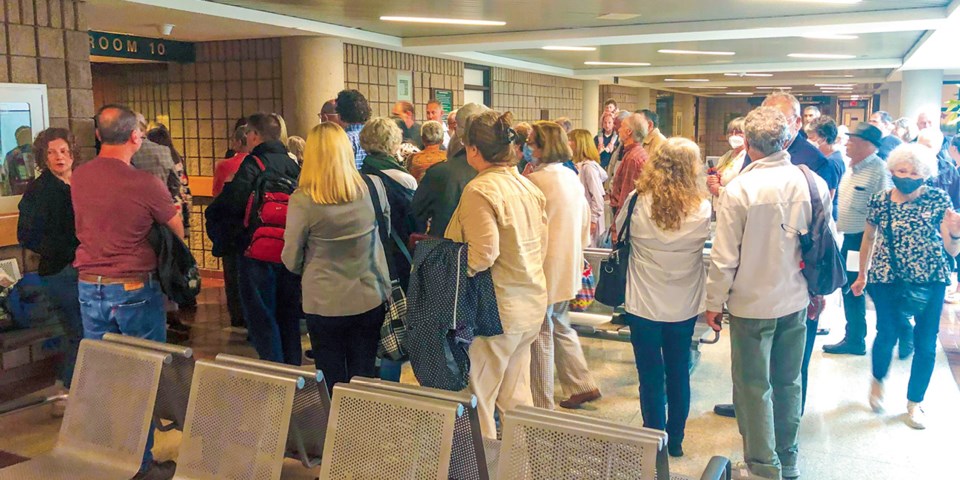Without explaining why, Judge Joseph De Filippis began what was to be a sentencing proceeding last Friday, August 5, by saying that he would not in fact be imposing a sentence upon Jason Lusted, 50, who pleaded guilty in June to manslaughter of 74-year-old Fenwick resident Earl Clapp, who interrupted Lusted and another man as they attempted to steal a trailer from Clapp’s property in the early morning hours of October 2, 2020.
The other defendant, Matthew MacInnes, 40, pleaded guilty in March on lesser charges of theft, and testified for the Crown, saying that upon Clapp’s appearance in a driveway, Lusted returned to their vehicle and deliberately turned toward Clapp, striking him, and dragging him nearly two kilometers north then west along Highway 20, where his body was found by a passing motorist.
About 40 family members and friends were in the courtroom—the largest in St. Catharines— some coming from as far as Sudbury.
In argument before the court in June, Lusted’s lawyer suggested that the judge take into account his client’s alleged Indigenous ancestry, a mitigating factor under law determined by a Gladue report, a pre-sentencing document that attempts to quantify the degree to which systemic racism may have impacted a defendant’s life.
On Friday, however, Lusted’s lawyer conceded that the Gladue report was unable to confirm any Indigenous ancestry, leaving such considerations a non-factor.
In June, 76 victim impact statements were delivered to the court. Standing beside a large photograph of her husband, Earl’s widow, Tillie Clapp, told the court that she remembered first meeting her husband in 1962, on a Sudbury school bus.
“He was handsome, but shy and humble,” she said, “and I came to learn that his best parts were deep within his character.”
They were together 58 years.
“Earl had a spontaneity, and a sense of joie de vivre,” said Tillie. “He made me feel cherished and appreciated.”
After receiving records from the Thorold Detention Centre and Maplehurst Correctional Complex, the Crown and defense arrived at agreement regarding the number of days Lusted spent in custody since his arrest. Each day earned a ratio of 1.5 days credit to one day served. The number of days that Lusted was in lockdown due to Covid-related staffing shortages will also be considered.
Earl had a spontaneity, and a sense of joie de vivre. He made me feel cherished and appreciated.
A total of 1,435 days of credit was proposed by the defense to be subtracted from whatever sentence is imposed.
The family listened and cried softly as the calculations to arrive at the total credit were negotiated, as the amount of credit increased with each step to nearly four years—while Lusted has actually been in custody for less than two years.
Unlike murder charges, manslaughter does not carry an automatic sentence of life imprisonment. It remains, however, an option for the court. If life imprisonment is ordered, there is no minimum time that is automatically required to be served before parole eligibility. Those sentenced to life imprisonment for manslaughter would be eligible for parole after serving seven years. It may be possible for the court to delay parole eligibility for a life sentence for manslaughter up to ten years.
It is also common for manslaughter convictions to result in sentences other than life imprisonment. A nine-year sentence, which is not uncommon, would allow the offender to be paroled after serving three years of his sentence.
Lusted’s lawyer asked the judge to consider making a recommendation to Corrections Canada that Lusted be able to serve his sentence at Bath—Lusted had done research and favoured this location. Bath Institution is located just east of the city of Bath, Ontario, approximately 25 kilometres west of Kingston. Located on a Federal Reserve property, the property is shared with Millhaven Institution. Bath Institution is a standalone medium security facility based on an open campus design model.
Lusted read a statement to the court, saying that he made a selfish and careless decision. He apologized for the pain he caused the family and that he never wanted to hurt anyone that night.
Between 1989 and 2016, Lusted had accumulated 59 separate charges and 40 convictions, including assault, theft, impersonation, and driving and parole violations. In his own words at a previous trial, he declared, “I’m not sitting up here telling you that I’m a choir boy. I’m a career criminal.”
Sentencing is now scheduled to occur at the St. Catharines Courthouse on September 22, at 2 PM.



